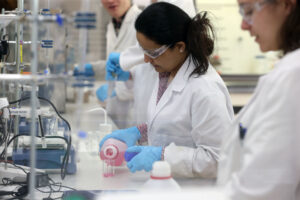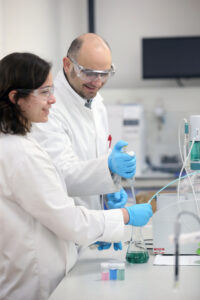Year 1
Year 1 is is an essential element of the 4 year PhD student training within the CDT. The training that you receive during this year will prepare you for a PhD research project at one of the three universities.
- Begins with a 3-day residential induction and training at each university which provides an introduction to the host university and includes workshops, lectures and other activities related to their specialist areas. At the end of the induction week every student should have the same breadth of knowledge across the field of catalysis.
- Between the October and before the Christmas break, there will be lectures, seminars and workshops shared around the three universities, which you will need to travel between on a regular basis. Other activities during this period will include a Catalyst Design Project (done in teams) and three Laboratory Projects.
- In January, there is a scheduled month of revision and exams and from there the extended Research Sabbaticals. From May onwards, you will be planning your research project for Years 2-4.
The taught components, in the form of lectures, seminars and workshops, will cover the key concepts and recent advances in catalysis. These will be divided into three 20 credit modules covering Advanced heterogeneous catalysis (CHT401) taught in Cardiff, Recent advances in homogeneous catalysis (CHT402) taught in Bristol , and Chemical and catalytic reaction engineering (CHT403) taught in Bath.
Years 2-4
Progression to Year 2 of the CDT course requires that you have an agreed PhD project in place and that you have successfully completed the MRes programme. As the MRes course is the first year of a four year PhD course, an essential component will be the PhD engagement exercises over the last 10 weeks. During this time you will be involved in defining your PhD project.
The process will actually start much earlier in the year, when a portfolio of around 20-30 research themes will be proposed by the academic staff from the three universities. The themes will be presented to you and your colleagues in a series of brainstorming sessions, which will last for 2-3 hours. These sessions will involve:

Research Labs
-
the academic co-supervisors justifying the inclusion of the research themes (key references will be made available beforehand to give you an opportunity for background reading and reflection);
-
an intense idea-generation phase, facilitated by the CDT Manager;
-
feedback of ideas to the academic co-investigators;
-
prioritisation of ideas.
The outputs from the brainstorming sessions will be recorded to provide you with a starting point when it comes to defining your project.
With the help of the academic staff and industrial mentors, you will select and define your area of research. Finally, you will write up your individual project description, using a prescribed format and word count, as if you were submitting an application to a national or international funding body.




